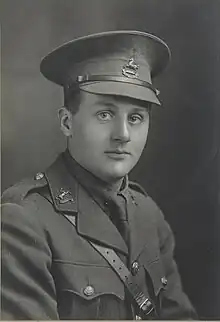Waterloo (UK Parliament constituency)
Waterloo was a parliamentary constituency centred on the district of Waterloo north of Liverpool in Lancashire. It returned one Member of Parliament (MP) to the House of Commons of the Parliament of the United Kingdom, elected by the first past the post system.
| Waterloo | |
|---|---|
| Former Borough constituency for the House of Commons | |
| 1918–1950 | |
| Seats | one |
| Created from | Southport |
| Replaced by | Crosby |
History
The constituency was created for the 1918 general election. It was abolished for the 1950 general election.
Boundaries
The Urban Districts of Great Crosby, Litherland, Little Crosby, and Waterloo with Seaforth.
Members of Parliament
| Year | Member | Party | |
|---|---|---|---|
| 1918 | Albert Buckley | Unionist | |
| 1923 | Malcolm Bullock | Unionist | |
| 1950 | constituency abolished | ||
Election results
Elections in the 1910s
| Party | Candidate | Votes | % | ±% | |
|---|---|---|---|---|---|
| C | Unionist | Albert Buckley | 13,255 | 83.5 | |
| Labour | Samuel Reeves | 2,619 | 16.5 | ||
| Majority | 10,636 | 67.0 | |||
| Turnout | 15,874 | ||||
| Unionist win (new seat) | |||||
| C indicates candidate endorsed by the coalition government. | |||||
Elections in the 1920s

Stewart-Brown
| Party | Candidate | Votes | % | ±% | |
|---|---|---|---|---|---|
| Unionist | Albert Buckley | 12,967 | 67.3 | -16.2 | |
| Liberal | Nessie Stewart-Brown | 6,300 | 32.7 | New | |
| Majority | 6,667 | 34.6 | -32.4 | ||
| Turnout | 19,267 | 69.4 | +2.4 | ||
| Unionist hold | Swing | N/A | |||
| Party | Candidate | Votes | % | ±% | |
|---|---|---|---|---|---|
| Unionist | Malcolm Bullock | 10,615 | 51.2 | -16.1 | |
| Liberal | Robert Lowden Connell | 9,965 | 48.4 | +15.7 | |
| Majority | 650 | 2.4 | -32.2 | ||
| Turnout | 20,580 | ||||
| Unionist hold | Swing | -16.1 | |||
| Party | Candidate | Votes | % | ±% | |
|---|---|---|---|---|---|
| Unionist | Malcolm Bullock | 15,704 | 72.0 | +20.8 | |
| Labour | George Frank Titt | 6,116 | 28.0 | New | |
| Majority | 9,588 | 44.0 | +41.6 | ||
| Turnout | 21,820 | ||||
| Unionist hold | Swing | N/A | |||

Sellars
| Party | Candidate | Votes | % | ±% | |
|---|---|---|---|---|---|
| Unionist | Malcolm Bullock | 17,299 | 52.1 | -19.9 | |
| Labour | John Clifford Leigh | 8,142 | 24.5 | -3.5 | |
| Liberal | Frederic Aked Sellars | 7,728 | 23.3 | New | |
| Majority | 9,157 | 27.6 | -16.4 | ||
| Turnout | 33,169 | ||||
| Unionist hold | Swing | -8.2 | |||
Elections in the 1930s
| Party | Candidate | Votes | % | ±% | |
|---|---|---|---|---|---|
| Unionist | Malcolm Bullock | Unopposed | |||
| Unionist hold | |||||
| Party | Candidate | Votes | % | ±% | |
|---|---|---|---|---|---|
| Unionist | Malcolm Bullock | Unopposed | |||
| Unionist hold | |||||
Elections in the 1940s
| Party | Candidate | Votes | % | ±% | |
|---|---|---|---|---|---|
| Conservative | Malcolm Bullock | 19,650 | 47.4 | N/A | |
| Labour | Philip Vos | 13,795 | 33.3 | New | |
| Liberal | Joseph Daniel Weir | 7,823 | 18.8 | New | |
| Independent | Cyril Foster | 195 | 0.5 | New | |
| Majority | 5,855 | 14.1 | N/A | ||
| Turnout | 41,463 | ||||
| Conservative hold | Swing | -8.2 | |||
References
- Debrett's House of Commons and the Judicial Bench
- The Times House of Commons, 1929
- The Times House of Commons, 1929
- The Times House of Commons, 1929
- Election results 1931 PoliticsResources
- Election results 1931 PoliticsResources
This article is issued from Wikipedia. The text is licensed under Creative Commons - Attribution - Sharealike. Additional terms may apply for the media files.